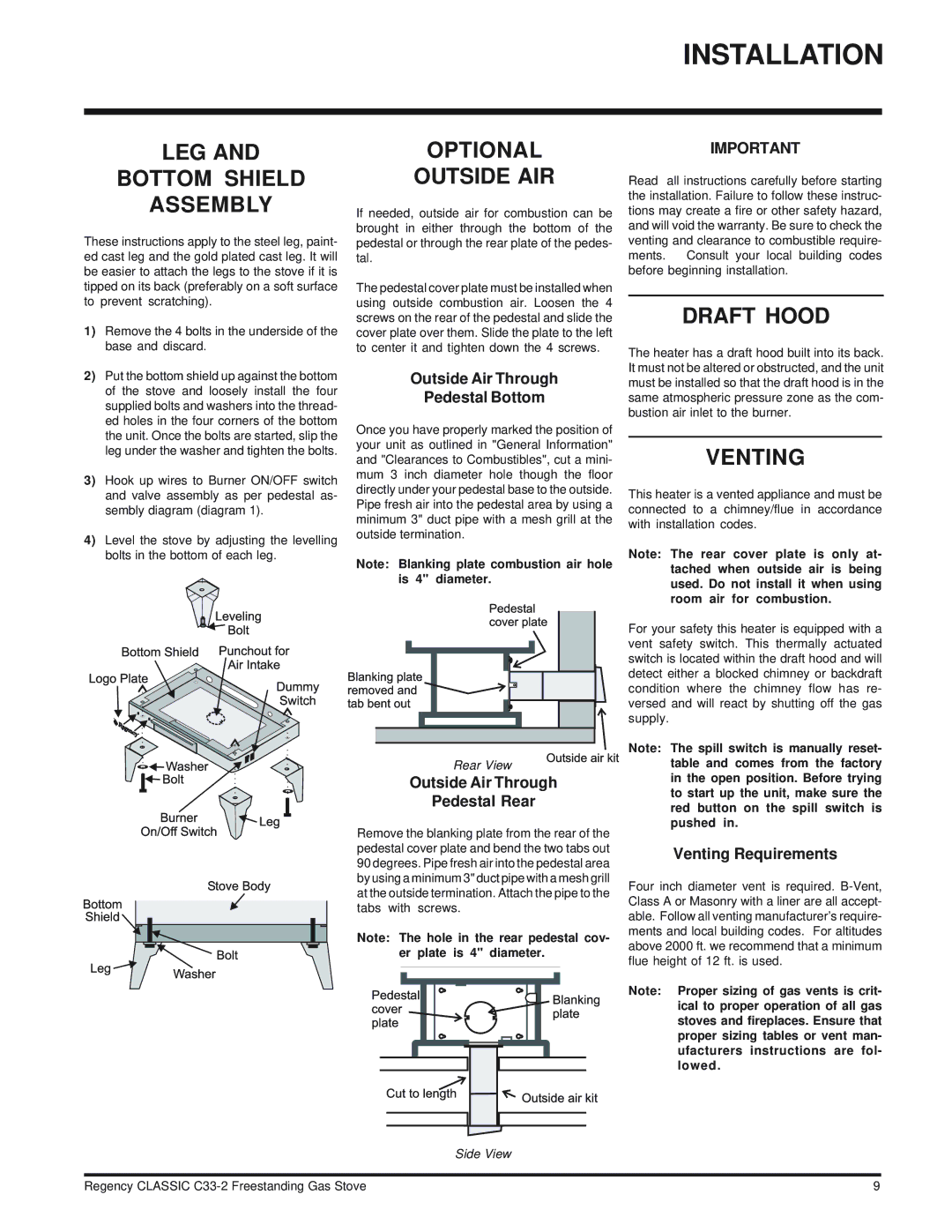
INSTALLATION
LEG AND
BOTTOM SHIELD
ASSEMBLY
These instructions apply to the steel leg, paint- ed cast leg and the gold plated cast leg. It will be easier to attach the legs to the stove if it is tipped on its back (preferably on a soft surface to prevent scratching).
1)Remove the 4 bolts in the underside of the base and discard.
2)Put the bottom shield up against the bottom of the stove and loosely install the four supplied bolts and washers into the thread- ed holes in the four corners of the bottom the unit. Once the bolts are started, slip the leg under the washer and tighten the bolts.
3)Hook up wires to Burner ON/OFF switch and valve assembly as per pedestal as- sembly diagram (diagram 1).
4)Level the stove by adjusting the levelling bolts in the bottom of each leg.
OPTIONAL
OUTSIDE AIR
If needed, outside air for combustion can be brought in either through the bottom of the pedestal or through the rear plate of the pedes- tal.
The pedestal cover plate must be installed when using outside combustion air. Loosen the 4 screws on the rear of the pedestal and slide the cover plate over them. Slide the plate to the left to center it and tighten down the 4 screws.
Outside Air Through
Pedestal Bottom
Once you have properly marked the position of your unit as outlined in "General Information" and "Clearances to Combustibles", cut a mini- mum 3 inch diameter hole though the floor directly under your pedestal base to the outside. Pipe fresh air into the pedestal area by using a minimum 3" duct pipe with a mesh grill at the outside termination.
Note: Blanking plate combustion air hole is 4" diameter.
Rear View
Outside Air Through
Pedestal Rear
Remove the blanking plate from the rear of the pedestal cover plate and bend the two tabs out 90 degrees. Pipe fresh air into the pedestal area by using a minimum 3" duct pipe with a mesh grill at the outside termination. Attach the pipe to the tabs with screws.
Note: The hole in the rear pedestal cov- er plate is 4" diameter.
IMPORTANT
Read all instructions carefully before starting the installation. Failure to follow these instruc- tions may create a fire or other safety hazard, and will void the warranty. Be sure to check the venting and clearance to combustible require- ments. Consult your local building codes before beginning installation.
DRAFT HOOD
The heater has a draft hood built into its back. It must not be altered or obstructed, and the unit must be installed so that the draft hood is in the same atmospheric pressure zone as the com- bustion air inlet to the burner.
VENTING
This heater is a vented appliance and must be connected to a chimney/flue in accordance with installation codes.
Note: The rear cover plate is only at- tached when outside air is being used. Do not install it when using room air for combustion.
For your safety this heater is equipped with a vent safety switch. This thermally actuated switch is located within the draft hood and will detect either a blocked chimney or backdraft condition where the chimney flow has re- versed and will react by shutting off the gas supply.
Note: The spill switch is manually reset- table and comes from the factory in the open position. Before trying to start up the unit, make sure the red button on the spill switch is pushed in.
Venting Requirements
Four inch diameter vent is required.
Note: Proper sizing of gas vents is crit- ical to proper operation of all gas stoves and fireplaces. Ensure that proper sizing tables or vent man- ufacturers instructions are fol- lowed.
Side View
Regency CLASSIC | 9 |
